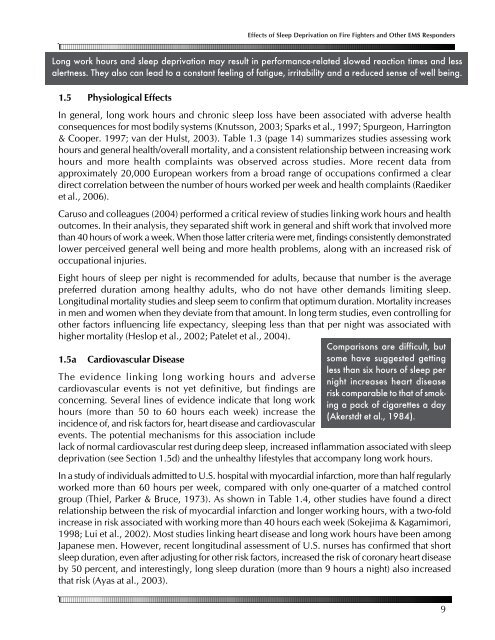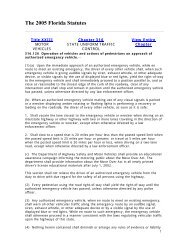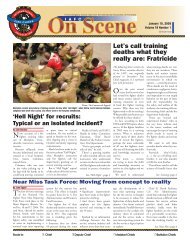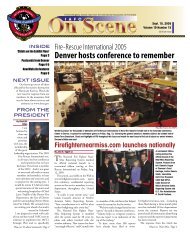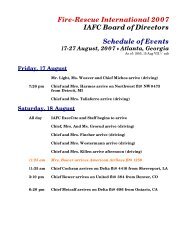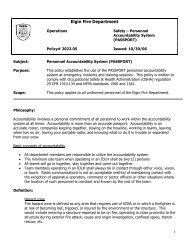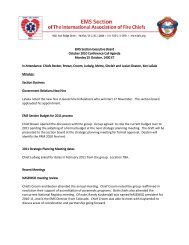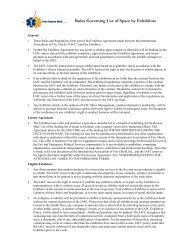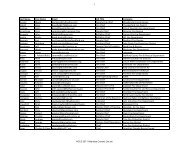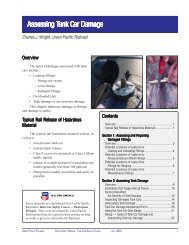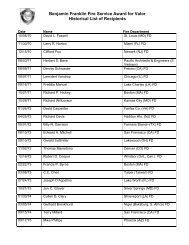Effects of Sleep Deprivation on Fire Fighters and EMS ... - NAEMT
Effects of Sleep Deprivation on Fire Fighters and EMS ... - NAEMT
Effects of Sleep Deprivation on Fire Fighters and EMS ... - NAEMT
Create successful ePaper yourself
Turn your PDF publications into a flip-book with our unique Google optimized e-Paper software.
<str<strong>on</strong>g>Effects</str<strong>on</strong>g> <str<strong>on</strong>g>of</str<strong>on</strong>g> <str<strong>on</strong>g>Sleep</str<strong>on</strong>g> <str<strong>on</strong>g>Deprivati<strong>on</strong></str<strong>on</strong>g> <strong>on</strong> <strong>Fire</strong> <strong>Fighters</strong> <strong>and</strong> Other <strong>EMS</strong> Resp<strong>on</strong>ders<br />
L<strong>on</strong>g work hours <strong>and</strong> sleep deprivati<strong>on</strong> may result in performance-related slowed reacti<strong>on</strong> times <strong>and</strong> less<br />
alertness. They also can lead to a c<strong>on</strong>stant feeling <str<strong>on</strong>g>of</str<strong>on</strong>g> fatigue, irritability <strong>and</strong> a reduced sense <str<strong>on</strong>g>of</str<strong>on</strong>g> well being.<br />
1.5 Physiological <str<strong>on</strong>g>Effects</str<strong>on</strong>g><br />
In general, l<strong>on</strong>g work hours <strong>and</strong> chr<strong>on</strong>ic sleep loss have been associated with adverse health<br />
c<strong>on</strong>sequences for most bodily systems (Knutss<strong>on</strong>, 2003; Sparks et al., 1997; Spurge<strong>on</strong>, Harringt<strong>on</strong><br />
& Cooper. 1997; van der Hulst, 2003). Table 1.3 (page 14) summarizes studies assessing work<br />
hours <strong>and</strong> general health/overall mortality, <strong>and</strong> a c<strong>on</strong>sistent relati<strong>on</strong>ship between increasing work<br />
hours <strong>and</strong> more health complaints was observed across studies. More recent data from<br />
approximately 20,000 European workers from a broad range <str<strong>on</strong>g>of</str<strong>on</strong>g> occupati<strong>on</strong>s c<strong>on</strong>firmed a clear<br />
direct correlati<strong>on</strong> between the number <str<strong>on</strong>g>of</str<strong>on</strong>g> hours worked per week <strong>and</strong> health complaints (Raediker<br />
et al., 2006).<br />
Caruso <strong>and</strong> colleagues (2004) performed a critical review <str<strong>on</strong>g>of</str<strong>on</strong>g> studies linking work hours <strong>and</strong> health<br />
outcomes. In their analysis, they separated shift work in general <strong>and</strong> shift work that involved more<br />
than 40 hours <str<strong>on</strong>g>of</str<strong>on</strong>g> work a week. When those latter criteria were met, findings c<strong>on</strong>sistently dem<strong>on</strong>strated<br />
lower perceived general well being <strong>and</strong> more health problems, al<strong>on</strong>g with an increased risk <str<strong>on</strong>g>of</str<strong>on</strong>g><br />
occupati<strong>on</strong>al injuries.<br />
Eight hours <str<strong>on</strong>g>of</str<strong>on</strong>g> sleep per night is recommended for adults, because that number is the average<br />
preferred durati<strong>on</strong> am<strong>on</strong>g healthy adults, who do not have other dem<strong>and</strong>s limiting sleep.<br />
L<strong>on</strong>gitudinal mortality studies <strong>and</strong> sleep seem to c<strong>on</strong>firm that optimum durati<strong>on</strong>. Mortality increases<br />
in men <strong>and</strong> women when they deviate from that amount. In l<strong>on</strong>g term studies, even c<strong>on</strong>trolling for<br />
other factors influencing life expectancy, sleeping less than that per night was associated with<br />
higher mortality (Heslop et al., 2002; Patelet et al., 2004).<br />
1.5a Cardiovascular Disease<br />
The evidence linking l<strong>on</strong>g working hours <strong>and</strong> adverse<br />
cardiovascular events is not yet definitive, but findings are<br />
c<strong>on</strong>cerning. Several lines <str<strong>on</strong>g>of</str<strong>on</strong>g> evidence indicate that l<strong>on</strong>g work<br />
hours (more than 50 to 60 hours each week) increase the<br />
incidence <str<strong>on</strong>g>of</str<strong>on</strong>g>, <strong>and</strong> risk factors for, heart disease <strong>and</strong> cardiovascular<br />
events. The potential mechanisms for this associati<strong>on</strong> include<br />
Comparis<strong>on</strong>s are difficult, but<br />
some have suggested getting<br />
less than six hours <str<strong>on</strong>g>of</str<strong>on</strong>g> sleep per<br />
night increases heart disease<br />
risk comparable to that <str<strong>on</strong>g>of</str<strong>on</strong>g> smoking<br />
a pack <str<strong>on</strong>g>of</str<strong>on</strong>g> cigarettes a day<br />
(Akerstdt et al., 1984).<br />
lack <str<strong>on</strong>g>of</str<strong>on</strong>g> normal cardiovascular rest during deep sleep, increased inflammati<strong>on</strong> associated with sleep<br />
deprivati<strong>on</strong> (see Secti<strong>on</strong> 1.5d) <strong>and</strong> the unhealthy lifestyles that accompany l<strong>on</strong>g work hours.<br />
In a study <str<strong>on</strong>g>of</str<strong>on</strong>g> individuals admitted to U.S. hospital with myocardial infarcti<strong>on</strong>, more than half regularly<br />
worked more than 60 hours per week, compared with <strong>on</strong>ly <strong>on</strong>e-quarter <str<strong>on</strong>g>of</str<strong>on</strong>g> a matched c<strong>on</strong>trol<br />
group (Thiel, Parker & Bruce, 1973). As shown in Table 1.4, other studies have found a direct<br />
relati<strong>on</strong>ship between the risk <str<strong>on</strong>g>of</str<strong>on</strong>g> myocardial infarcti<strong>on</strong> <strong>and</strong> l<strong>on</strong>ger working hours, with a two-fold<br />
increase in risk associated with working more than 40 hours each week (Sokejima & Kagamimori,<br />
1998; Lui et al., 2002). Most studies linking heart disease <strong>and</strong> l<strong>on</strong>g work hours have been am<strong>on</strong>g<br />
Japanese men. However, recent l<strong>on</strong>gitudinal assessment <str<strong>on</strong>g>of</str<strong>on</strong>g> U.S. nurses has c<strong>on</strong>firmed that short<br />
sleep durati<strong>on</strong>, even after adjusting for other risk factors, increased the risk <str<strong>on</strong>g>of</str<strong>on</strong>g> cor<strong>on</strong>ary heart disease<br />
by 50 percent, <strong>and</strong> interestingly, l<strong>on</strong>g sleep durati<strong>on</strong> (more than 9 hours a night) also increased<br />
that risk (Ayas at al., 2003).<br />
9


